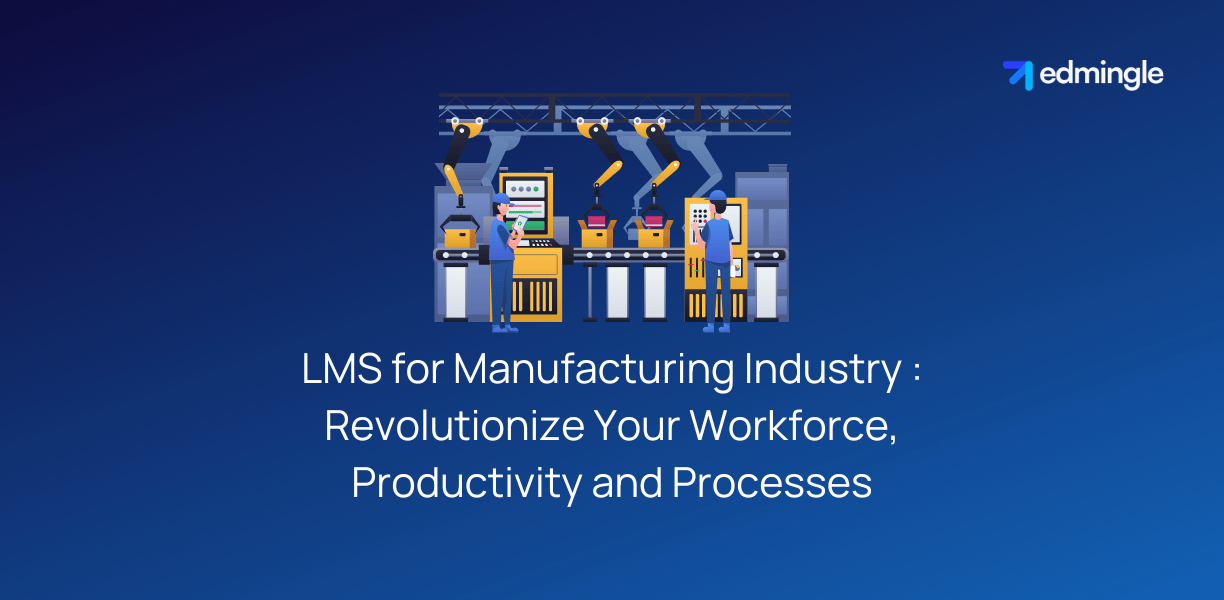
In the world of industrial transformation, efficiency and innovation are not just goals but necessities. And, factory success is defined ultimately by the quality of produce.
At the heart of all this, lies efficient employee training. This is where an LMS for manufacturing training emerges as the gamechanger for entities of all sizes.
The integration of learning management systems (LMSs) in the manufacturing sector is revolutionizing how we approach workforce upskilling, productivity, and overall factory processes.
Imagine a factory where every employee, from the workshop floor to the managerial office, is not only well-versed in their current roles but is continuously evolving with the industry’s rapid pace.
As we navigate through this blog, we will uncover how LMS empowers manufacturing units to not just keep up, but lead in a competitive global market. Stay with us as we unfold the layers of LMS in manufacturing.
What is an LMS for Manufacturing Industry?
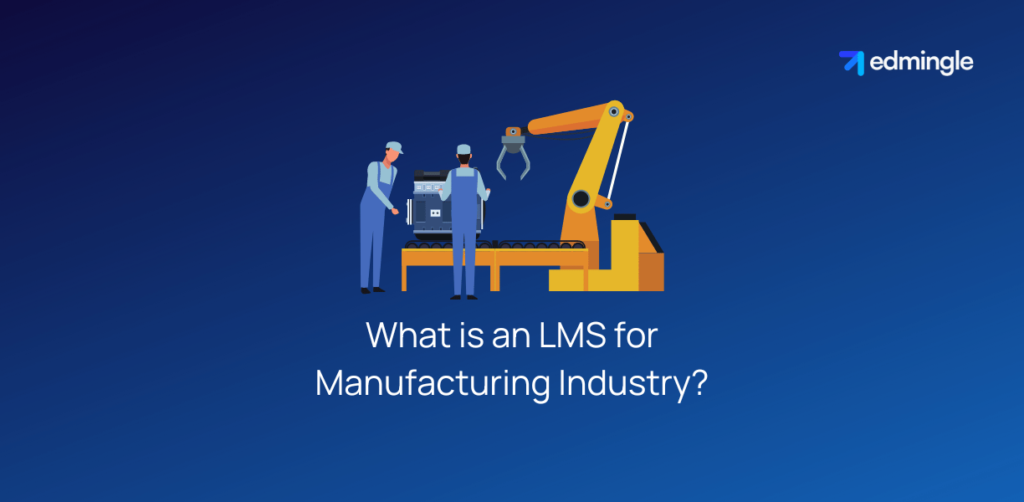
An LMS for the manufacturing industry is tailored to meet the specific L&D development needs of the sector. And, it directly improves the employee turnover rate in the industry.
It is also, synonymously known as a manufacturing training software.
It enables efficient delivery, management, and tracking of educational content and training programs, crucial for maintaining workforce proficiency in this highly specialized field.
Such a system is vital for addressing industry-specific challenges such as compliance, technical skill enhancement, employee safety education, and adapting to rapidly evolving technologies.
By providing a centralized, accessible, and interactive learning environment, an LMS helps manufacturing companies ensure that their team/employees are consistently updated with the latest operational standards, techniques, and safety protocols.
This not only fosters a more competent and informed workforce but also significantly contributes to enhancing overall productivity and operational efficiency within the manufacturing arena.
Since we talked about operational efficiency, you would be thrilled to know that Edmingle can reduce your operational costs by up to 20%.
8 Reasons Why an LMS is Required in the Manufacturing Industry
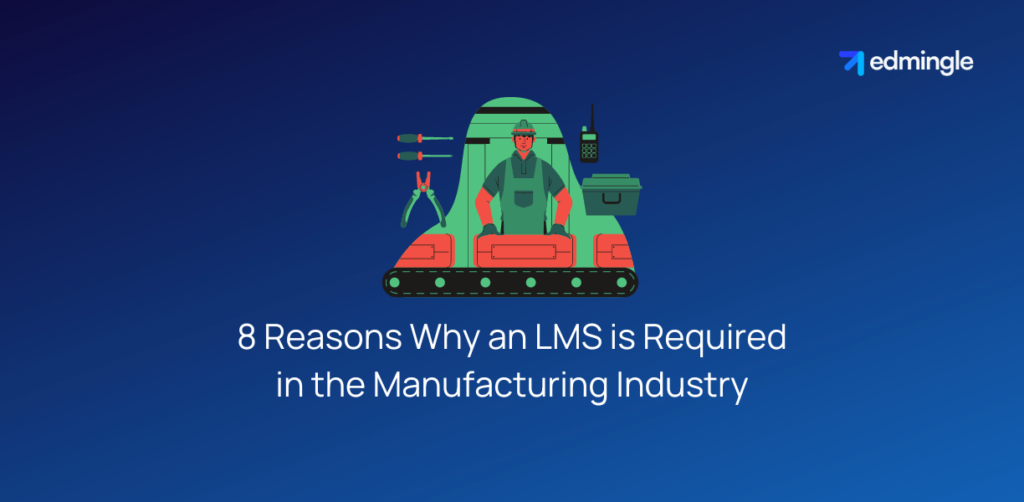
Amidst the constant hustle for innovation, productivity & efficiency, learning often takes the backseat in the manufacturing sector.
To change this, a learning management system is required for the following key reasons:
- Standardized Training and Compliance: The manufacturing industry often requires adherence to strict safety standards and regulatory compliances. An LMS ensures that all learners/staff receive consistent and up-to-date learning on these critical aspects, helping to minimize risks and legal issues.
- Skill Development and Upgradation: With rapid technological advancements, the manufacturing sector constantly needs to upgrade skills and techniques. An LMS facilitates ongoing learning and skill development, ensuring that the workforce is proficient with the latest equipment and processes.
- Efficient Training Management: Manufacturing environments are dynamic and time-sensitive. An LMS allows for efficient management of training programs without disrupting production schedules. It offers flexible learning opportunities, such as on-demand training courses that learners can access at their convenience.
- Tracking and Reporting: An LMS provides tools for tracking progress, training status and completion of course modules. This data is crucial for evaluating the effectiveness of training campaigns and ensuring compliance with industry standards.
- Cost-Effectiveness: Traditional methods of knowledge delivery can be expensive and resource-intensive. An LMS reduces costs related to trainers, materials, travel, and venue by providing a digital platform for learning.
- Customized Learning Paths: Manufacturing roles can vary significantly. An LMS allows for the creation of customized learning paths that cater to the specific needs and roles of different staff, enhancing the relevance and effectiveness.
- Enhancing Productivity and Quality: A well-trained manufacturing workforce is more likely to work efficiently and maintain high quality in their operations. An LMS ensures that all members of the workforce are adequately trained, directly impacting productivity and quality of output.
- Scalability and Accessibility: As manufacturing companies grow, their needs evolve. An LMS that is accessible, scalable & flexible can easily be updated with new content, making it a long-term solution for training needs. Additionally, cloud-based learning management systems/SaaS LMS platforms offer accessibility across multiple locations, beneficial for companies with multiple manufacturing sites.
In short, an LMS is a vital tool in the manufacturing industry for ensuring a competent, compliant, and efficient workforce, aligning with the industry’s fast-paced and ever-evolving nature.
Furthermore, an LMS that supports blended learning can work wonders in efficiently training your workforce.
12 Key Features of an LMS for Manufacturing Industry
An LMS designed for the manufacturing industry typically includes several key features tailored to meet its specific needs.
These might match with the features of an LMS. However, the table below enlists them all:
| 1. Customizable Content and Courses | Ability to create and customize courses specific to manufacturing processes, machinery, safety protocols, and compliance requirements. |
| 2. Interactive Modules | Incorporation of interactive elements like videos, simulations, and virtual reality to simulate real-world manufacturing scenarios for hands-on learning experiences. |
| 3. Mobile Accessibility | Support for mobile learning, allowing employees to access learning materials and courses on-the-go or directly on the factory floor. |
| 4. Tracking and Reporting | Advanced tracking and reporting features to monitor learner progress, course completions, and assess the effectiveness of training programs. |
| 5. Compliance Management | Features to manage and track compliance training, ensuring all employees are up-to-date with industry regulations and standards. |
| 6. Assessment and Certification | Tools to create assessments and quizzes to test knowledge and skills, and provide certifications upon successful completion of courses. |
| 7. Skill Gap Analysis | Functions to assess and identify skill gaps within the workforce, enabling targeted interventions. |
| 8. Scalability | The ability to scale up and accommodate the growing needs of the manufacturing company, including adding new users, courses, and content. |
| 9. User-Friendly Interface | An intuitive and easy-to-navigate interface that is accessible to employees of varying tech proficiencies. |
| 10. Multi-language Support | To accommodate a diverse workforce, multi-language support is essential for delivering training in various languages. |
| 11. Integration Capabilities | Ability to integrate with other HR and operational systems within the organization for seamless data flow and management. |
| 12. Feedback and Communication Tools | Social learning features that allow for feedback from learners and communication tools to facilitate discussions and queries related to training content. |
These features collectively ensure that an LMS is effective in delivering comprehensive, relevant & engaging training to its workforce, ultimately enhancing overall productivity and compliance.
11 Benefits of an LMS for a Manufacturing Business
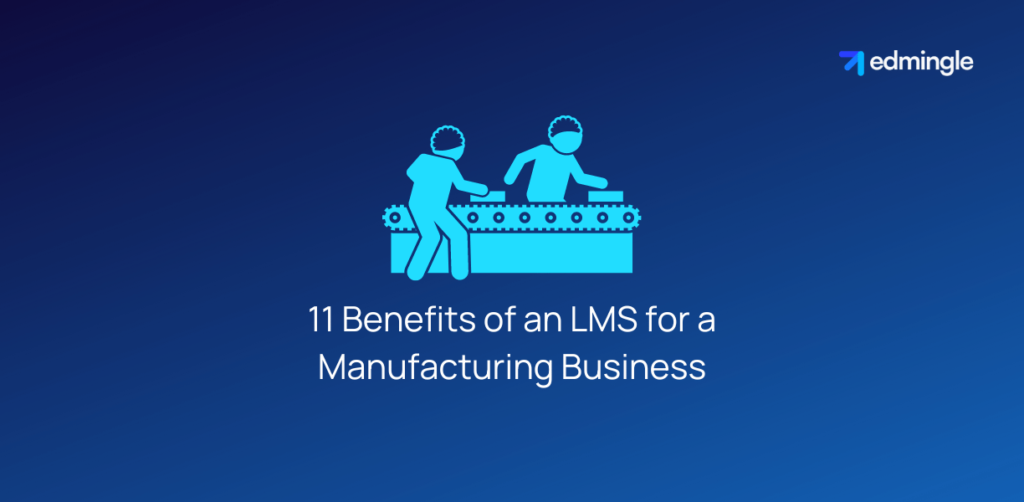
Implementing a learning management system (LMS) in a manufacturing business might appear a little complex but brings with it a multitude of benefits, significantly impacting various aspects of operations.
The factory workforce gets better, productivity enhances along with improved processes. Additionally, other benefits are listed as follows:
- Enhanced Training Efficiency: An LMS streamlines the training process by making it faster and more efficient. Digital courses can be updated and distributed quickly, ensuring that all learners have access to the latest training materials.
- Cost Reduction: By moving to an online learning platform, manufacturing businesses can significantly reduce training costs associated with traditional methods, such as instructor fees, travel expenses, and physical materials.
- Improved Compliance Management: An LMS helps ensure that all learners/staff are trained on relevant regulations and safety procedures. It also keeps track of compliance training, which is critical in an industry subject to strict regulatory requirements.
- Consistent Training Quality: An LMS provides a standardized training experience, ensuring that every employee receives the same high-quality instruction, regardless of their location or department.
- Flexible Learning Opportunities: Manufacturing staff can access training materials at any time and from any location, making it easier to fit training into their schedules, especially for those who work on different shifts or in different locations.
- Skill Gap Identification and Closure: LMS systems can help identify skill gaps in the workforce and provide targeted training to address these gaps, thereby improving overall workforce competency.
- Real-time Progress Tracking and Reporting: The ability to track and generate comprehensive reports on learner progress in real-time allows for immediate feedback and adjustments to the training program, ensuring it meets its objectives effectively.
- Increased Employee Engagement and Retention: Interactive and engaging training programs can increase learner motivation and satisfaction, which in turn can lead to higher knowledge retention rates.
- Rapid Employee Onboarding: New staff can be brought up to speed more quickly and efficiently through structured online training programs, reducing the time it takes for them to become productive members of the team.
- Support for Continuous Learning: An LMS fosters a culture of continuous learning and improvement, which is essential in the fast-evolving manufacturing sector.
- Scalability: As the business grows, the LMS can easily scale to accommodate more users, online courses, and new types of training, making it a flexible solution for businesses of all sizes.
Therefore, by leveraging an LMS, manufacturing businesses can not only improve the efficiency and effectiveness of their learning programs but also gain a competitive edge through a more skilled and compliant workforce.
17 Best LMS for Manufacturing Industry in 2023
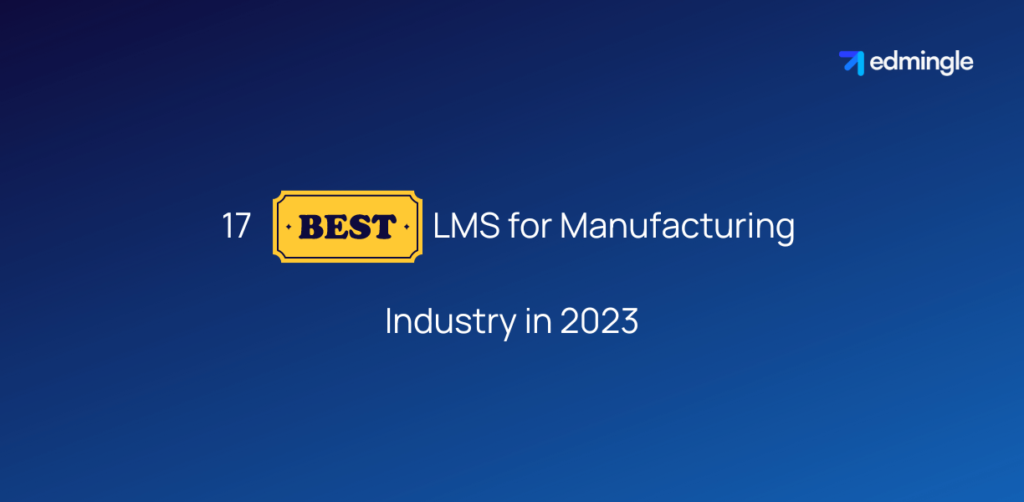
The manufacturing industry demands a unique blend of training and development strategies, and a learning management system (LMS) plays a pivotal role in meeting these needs.
Let’s explore the 17 best LMS platforms that are making a significant impact in the manufacturing sector.
1. Edmingle
Edmingle stands out with its user-friendly interface, exceptional approach to customer support & service, and comprehensive features.
It’s tailored for manufacturing companies looking for a seamless blend of ease-of-use and functionality, offering customizable course creation, real-time tracking, and interactive learning modules.
Furthermore, it’s trusted by leading training providers like Aditya Birla Education Academy, McGraw Hill and INFS.
2. Docebo
Renowned for its AI-powered learning platform, it offers a personalized learning experience, advanced analytics, and a robust set of features to streamline the training process for both small and large manufacturing firms.
3. Paradiso LMS
Paradiso LMS is known for its robust integrations and multi-language support, making it ideal for global manufacturing companies.
4. Vector LMS
Vector LMS shines in compliance management and safety training – critical aspects in the manufacturing industry.
5. TalentLMS
Simple & effective; it’s perfect for manufacturing businesses looking for a straightforward yet comprehensive LMS solution. It supports a blend of learning methods including microlearning.
6. Samelane LMS
Samelane LMS specializes in immersive learning experiences & is a great fit for manufacturing settings that require hands-on training, using techniques like virtual reality (VR) to simulate real-world scenarios.
7. SAP Litmos
SAP Litmos is a versatile & known for its strong analytics and mobile learning capabilities. It’s an excellent choice for manufacturing companies that prioritize data-driven training strategies and on-the-go learning.
8. SumTotal Learn
SumTotal Learn offers creating career paths and skill development tracks, making it a great tool for employee growth, professional development and succession planning.
9. ProProfs LMS
ProProfs LMS is lauded for its ease of use and a rich library of pre-made courses. It’s ideal for manufacturing businesses looking for a quick setup and a variety of ready-to-use training resources.
10. SkyPrep
Appreciated for its intuitive design and effective learning management features, it provides a streamlined UX, making it easy for both trainers and learners to navigate the system.
11. MapleLMS
MapleLMS stands out with its strong emphasis on security and compliance. It’s an ideal choice for manufacturing industries that handle sensitive data and require strict adherence to privacy and security standards.
You might also like to read about why data security is a necessity in e-learning & LMS platforms.
12. Elite LMS
Offering a blend of traditional and modern learning tools, its versatility in course delivery, including mobile learning and interactive content, makes it a suitable choice.
13. Meridian LMS
Tailored for complex learning environments, it’s designed to handle quality training needs, offering robust features for content management and delivery in large-scale manufacturing settings.
14. ExpertusONE
ExpertusONE provides powerful analytics and an engaging learner experience, suitable for large manufacturing companies with extensive training requirements.
15. PlayAblo LMS
PlayAblo LMS brings gamification into the learning sphere. Its engaging and interactive approach to training makes learning more enjoyable, thereby increasing learner engagement and retention.
16. Tovuti LMS
A comprehensive platform offering a wide range of tools, including e-commerce for selling courses. It’s a great fit for manufacturing firms looking to offer external training or certifications.
17. iSpring Learn
iSpring Learn is praised for its user-friendly design and seamless PowerPoint integration. It’s ideal for manufacturing companies that prefer to convert existing training materials into an online format easily.
Each of these LMS platforms brings unique strengths to the table. From compliance and safety training to skill development and learner/staff engagement, these systems are equipped to address the diverse needs of this dynamic sector.
But before you adopt & implement an LMS, make sure to read our blog on LMS Pricing.
Conclusion
As we’ve explored throughout this blog, the significance of a robust LMS for manufacturing industry cannot be overstated.
The right LMS can revolutionize how training is delivered, ensuring that it is efficient, cost-effective, and most importantly, impactful.
From enhancing compliance and safety protocols to fostering continuous skill development, the benefits of implementing an LMS in a manufacturing setting are clear and compelling.
We encourage you to explore what Edmingle has to offer and consider how it can align with your business goals and training objectives. Witness a change that promises not just better training outcomes, but a brighter future for your business.
FAQs on LMS for Manufacturing
How can an LMS benefit manufacturing organizations?
An LMS streamlines the training process in manufacturing organizations, ensuring standardized, up-to-date, and effective training. It helps in maintaining compliance, improving workforce skills, enhancing productivity, and reducing training costs through digital solutions.
Does an LMS offer integration with other manufacturing systems?
Yes, many modern LMS platforms offer integration capabilities with various manufacturing systems. This integration allows for seamless data flow and management, enhancing efficiency and providing a more cohesive training and operational experience.
Can an LMS be customized to meet the specific needs of manufacturing organizations?
Absolutely. Most LMS platforms are highly customizable, allowing manufacturing organizations to tailor content, learning paths, and assessments to meet their specific training requirements and organizational goals.
What are some important features to look for in a manufacturing LMS?
Key features of a manufacturing LMS include customizable content, interactive training modules, mobile accessibility, compliance management, skill gap analysis, scalable solutions, and robust tracking and reporting capabilities.
How to select the right LMS for manufacturing industry?
Selecting the right LMS involves assessing your organization’s specific needs, considering factors like the size of your workforce, the type of training required, integration capabilities, scalability, user-friendliness, and customer support offered by the LMS provider.
How can an LMS help improve the skills & knowledge of the manufacturing workforce?
A manufacturing LMS provides targeted training, up-to-date content, and interactive learning experiences. This helps in continuously upgrading the skills and knowledge of your workforce, ensuring they are proficient with the latest manufacturing technologies and processes.
Can the LMS accommodate a large number of factory employees, including operators, technicians & supervisors?
Yes, most manufacturing LMS platforms are designed to accommodate a large number of users with varied roles, from operators and technicians to supervisors and managers, providing relevant and role-specific training content.
Can the LMS integrate with existing manufacturing systems like manufacturing execution systems (MES) or enterprise resource planning (ERP) software?
Yes, many LMS platforms offer the ability to integrate with existing manufacturing systems like MES and ERP. This integration helps in aligning learning programs with operational data and processes, leading to more efficient and relevant training outcomes.






Leave a Reply